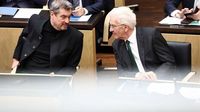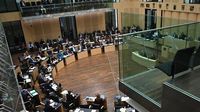The Bundesrat, Germany's federal council, delivered a historical decision on Friday, March 21, 2025, by approving a multi-billion euro financial package backing the coalition of Union and the SPD. Achieving the necessary two-thirds majority, the council agreed to relax the fiscal constraints of the debt brake, a key element in Germany's traditional financial discipline.
This ambitious financial package includes a substantial 500 billion euros earmarked for infrastructure and climate protection, enabling the federal government to invest significantly more in defense and security without violating constitutional budget rules. The approval came with support from twelve states, which collectively cast 53 votes in favor of the amendment to the Basic Law. However, four states—Brandenburg, Rhineland-Palatinate, Saxony-Anhalt, and Thuringia—chose to abstain from the vote, reflecting the divided opinions on the package.
Prior to this vote, the Bundestag had paved the way by approving the financial measures on March 18, indicating a shift in how Germany approaches national security funding in light of escalating global tensions. "This reform is crucial for the self-assertion of Europe," remarked Winfried Kretschmann, Minister-President of Baden-Württemberg, who voiced his strong support for the significant investments set to come from the new fund. The special fund aims to facilitate investments in modernization across various sectors, primarily in infrastructure such as roads, schools, and energy networks.
Following the approval, states can now take on loans equating to 0.35 percent of their GDP, amounting to approximately 15 billion euros annually. This precedent shifts budgetary power back into the hands of the federal states, reviving their capability to finance local projects, especially what is expected to be critical improvements in education and healthcare facilities.
However, the path to consensus was not without challenges. Several key political leaders expressed mixed feelings about the fiscal package. Manuela Schwesig, Minister-President of Mecklenburg-Vorpommern, admitted the topic of defense spending—a pivotal issue of contention—was viewed with skepticism by her coalition partners in the state government. "I support this package from a regional political responsibility perspective, but we must address our everyday problems, not just defense capabilities," she stressed, underscoring the delicate political balancing act required within her coalition.
In contrast, Bavarian Minister-President Markus Söder strongly advocated for the reforms, defending the necessity of the reforms in response to geopolitical strains, particularly citing recent conflicts in Ukraine. Söder, who played a crucial role in rallying support from his state, noted, "It is a question of responsibility over tactics," emphasizing that Germany's current global standing necessitated immediate and decisive actions.
Schleswig-Holstein and Lower Saxony also aligned in their support, further securing the two-thirds majority needed for approval. Schleswig-Holstein's Minister-President Daniel Günther indicated unwavering support for the fiscal measures, while Niedersachsen’s Stephan Weil assured constituents that non-support from his government would not jeopardize the package.
On the other hand, dissent emerged from states governed by coalitions that included the far-left party BSW; leaders from Brandenburg and Thuringia chose to abstain from voting in line with their party's resistance to increased defense outlays. As Minister-President of Brandenburg, Dietmar Woidke voiced that the decision reflected internal coalition disagreements on fiscal strategy.
With the Bundesrat's approval now secured, the next step involves formal enactment by Federal President Frank-Walter Steinmeier, who will review the legislation to ensure it complies with constitutional provisions. Early reports suggest legal experts in the presidential office have already begun this process. The expected signature will pave the way for this financial overhaul to become effective, marking a significant point in German fiscal policy.
As debates continue in the public arena regarding the appropriateness of such a fiscal shift, perceptions of the financial package are already raising eyebrows among citizens. A recent poll indicated that while a majority support the need for increased defense funding, opinions diverge significantly concerning the 500 billion euros earmarked for infrastructure. Friedrich Merz, the leader of the CDU, is now facing scrutiny as public trust in his leadership ebbs, with a substantial portion of voters feeling that previous promises regarding fiscal restraint have been compromised.
Despite these tensions, many leaders view the legislation as a necessary step toward combating years of neglect in infrastructure and more broadly addressing climate initiatives. As Kretschmann articulated, investment in both national security and infrastructure comes at a vital time, promoting a future where Germany can adapt to both domestic needs and international challenges.
This financial package and the subsequent movements following its approval signal a critical juncture for Germany as it seeks to navigate the complexities of modern governance, fiscal responsibility, and geopolitical reality.





